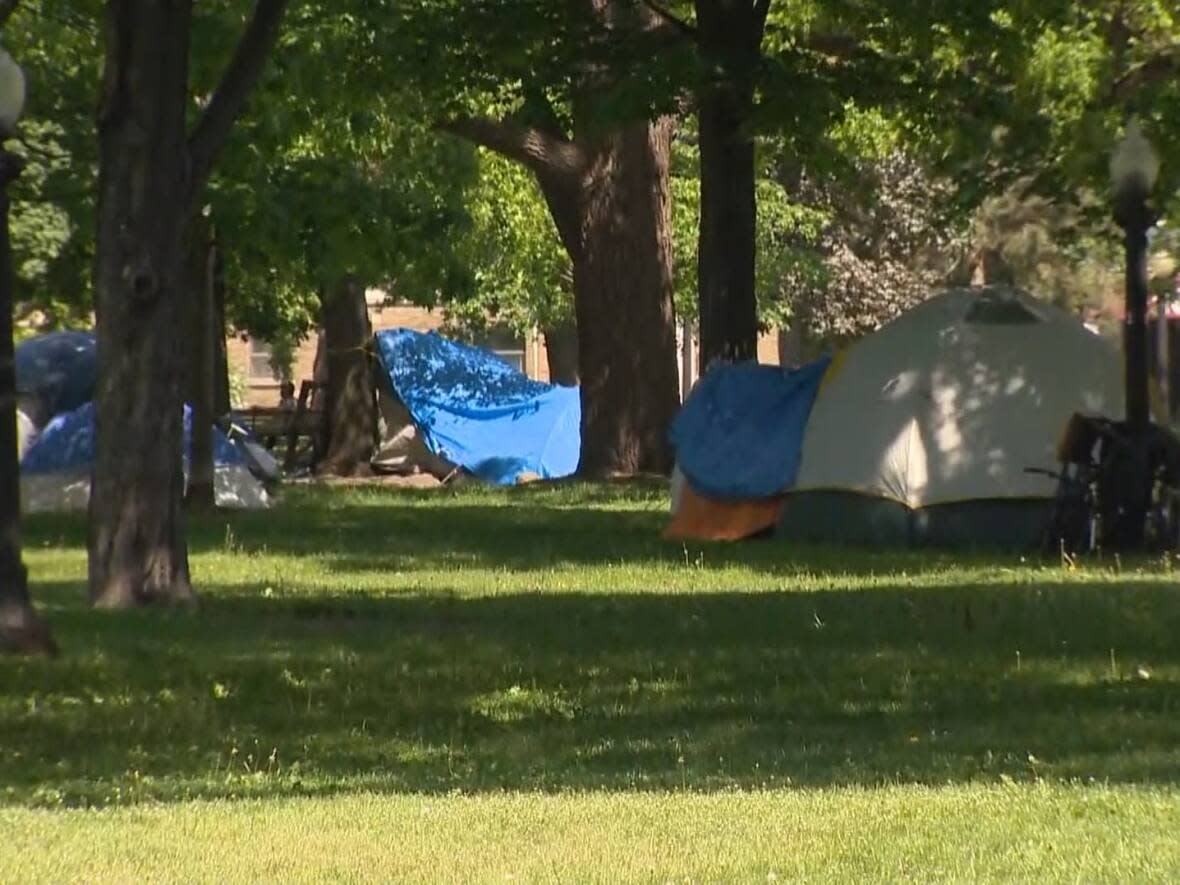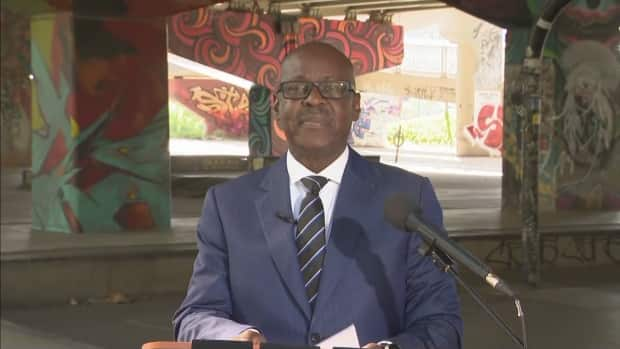What Toronto mayoral candidates promise to do about homeless encampments

Toronto's homeless encampments took centre stage on the mayoral campaign trail on Monday, with candidate Mark Saunders vowing to clear them from public spaces.
Saunders, Ana Bailão and Brad Bradford put forward proposals for more outreach, support and housing, while three of the other top six candidates — Mitzie Hunter, Olivia Chow and Josh Matlow — took a stand on the issue at a debate last week. The six are among a total of 102 people vying to replace John Tory.
Toronto saw a sharp rise in the number of encampments during the COVID-19 pandemic, with unhoused people choosing to sleep in tents instead of staying in homeless shelters. To deal with the situation, council, under Tory, oversaw a handful of encampment clearings that, at times, turned violent.
Toronto's ombudsman, Kwame Addo, sharply criticized those park clearings, saying the city chose speed over fairness when it cleared the sites. Advocates condemned the clearings, saying the city lacked compassion.
There are still several encampments across the city today, including a large one at Allan Gardens, a park downtown, which means the next mayor will have to develop a plan to deal with encampments.
Here's what some of the candidates have to say on the issue:
Mark Saunders
Former police chief Saunders said he would push for encampments to be dismantled, but added that the proper supports must be in place before tents come down. Saunders said he doesn't want to "normalize" such living conditions in Toronto. Encampments pose risks, he added.
"Encampments cannot be allowed to continue and must be removed while preserving the dignity to those people that live in the encampments," Saunders told reporters at the Underpass Park in Corktown Commons.
"This is not a one-size-fits-all solution. We're dealing with mental health, we're dealing with addiction, we're dealing with economic hardship, we're dealing with PTSD and we're dealing with trauma."
Saunders said encampments, which can be found in Toronto parks, in ravines, along trails and under bridges, are the "outcome of a failed system." He said any approach to encampments must start with the guiding principle that all people in Toronto deserve to live with dignity.

If elected mayor, he said he would develop a "wrap-around strategy" involving a continuity of care between the city, public health and community groups to better co-ordinate services better for unhoused people. He would also do the following:
Introduce a case management model that would make agencies more accountable.
Increase the number of mobile crisis response teams to provide 24-hour response.
Provide free space in unused city-owned buildings for non-profits that provide addiction treatment and want to expand their services.
Call on the province to waive tuition for the next three years for college students interested in obtaining a certificate as a mental health, addiction, or supportive housing worker or in studying supportive housing management.
Hire additional public health nurses.
Negotiate with builders of new rental buildings to include supportive units in their projects, which would be provided to non-profits to operate programs.
Ana Bailão
Speaking in front of a supportive housing building, former city councillor Bailão said she believes that housing is the answer to the problem of encampments.
"Encampments are not safe and not secure. I believe in a housing-first approach. When I was a city councillor and I had an encampment in my ward, I brought the outreach workers, the security, the supports from city staff and from the non-profits to house people directly from the park," she said.
Bailão said 25 people were housed directly from the park and more than 50 were brought into the shelters.

Bailão said she would do the following if elected:
Double the number of modular homes built in Toronto with a goal of 1,000 new homes by 2031.
Invest $5 million to move vulnerable residents living outside out of homelessness.
Expand the Toronto Community Crisis Service, which provides trained mental health professionals as an alternate response to police for people in crisis, to cover 100 per cent of the city.
Bring mobile mental health clinics, providing access to case workers and registered nurses, to areas of the city that need it most, including the TTC.
Direct $5 million to rental assistance for women and gender-diverse people escaping domestic violence to access immediate safe housing.
Hold the federal government financially accountable to support refugees and newcomers in Toronto, who currently comprise 30 per cent of all Toronto shelter occupants.
Hold the provincial government accountable on health care, including mental health care, for vulnerable residents who need wraparound services to remain housed.
Brad Bradford
Bradford, city councillor for Beaches-East York, said the solution to the housing crisis isn't "tent encampments in parks." Bradford said supportive housing, among other types of housing, is needed.
He said "it is not fair" that people are living in parks, and everyone needs the dignity of a roof over their head.
"As councillor, I built 59 supportive housing units with wraparound supports, apartments that people are renting right now today in East York. It's a drop in the bucket but it's a step in the right direction. And as mayor, we will do more of that because that is the answer to the housing crisis. That's the way forward and we have to do it faster," he said on the edge of Allan Gardens.

The issue of encampments also came up at the Toronto Region Board of Trade debate on Thursday, where each candidate was asked what they would do about the problem.
Hunter, Chow and Matlow weigh in
Hunter, former Liberal MPP for Scarborough-Guildwood, said she would provide housing.
"Sometimes people fall into an experience and it's our job as a city not to let them fail. We need to catch them. These are great individuals. We can't just scrape them out of parks and off the streets. We have to provide homes," she said.
Chow, former NDP and city councillor, said she agreed with Hunter, saying the city also needs to offer some kind of respite centre to people who are newly homeless.
"We need to immediately take a thousand folks out of the shelter through a rent supplement program so they can actually afford to rent an apartment," she said.
Matlow, city councillor for Toronto-St. Paul's, said he was opposed how the city cleared encampments, saying it was "violent and inhumane." People had told city workers that they did not feel safe in shelters and that is why they were living in parks, he said.
"We need to address that head on. Yes, it's a band-aid approach to have shelters, but they need to be humane places for people."
A full list of mayoral candidates can be found here.


